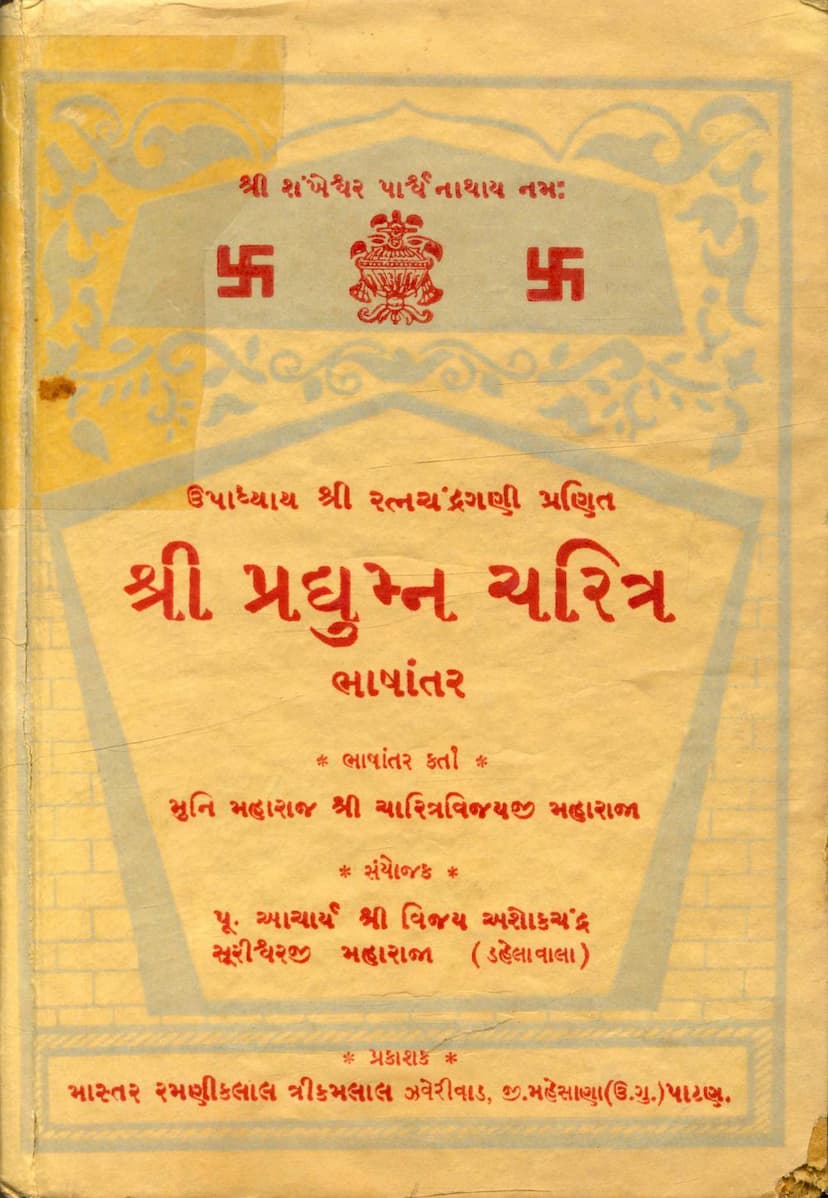Pradyumna Charitra
Added to library: September 2, 2025

Summary
Here's a comprehensive summary of the "Pradyumna Charitra" based on the provided text:
Title: Pradyumna Charitra (Story of Pradyumna)
Author: Upadhyay Ratnachandragani
Translators/Editors: Muni Maharaj Shri Charitravijayji (Translator), Poojya Acharya Shri Vijay Ashokchand Surishwarji Maharaj (Compiler)
Publisher: Kirti Prakashan, Surat
Overall Theme:
The "Pradyumna Charitra" is a significant Jain Mahakavya (epic poem) composed in Sanskrit by Upadhyay Ratnachandragani. The text chronicles the life and deeds of Pradyumna, the son of Lord Krishna and Rukmini, as well as other related narratives that delve into Jain philosophy, ethics, and the consequences of karma. The text emphasizes Jain principles through these stories.
Key Figures and Narratives:
- Pradyumna: The central figure, whose life journey is detailed. His story includes his abduction and subsequent life, his eventual reunion with his parents, and his spiritual journey.
- Lord Krishna and Rukmini: The divine parents of Pradyumna.
- Narada Muni: A celestial sage who plays a significant role in initiating events, particularly concerning the destiny of Pradyumna and the interactions between various characters. He is often depicted as a catalyst for both joy and sorrow, and his actions can be seen as a divine play to impart lessons.
- Rukmini's Abduction and Pradyumna's Birth: The narrative begins by describing the events leading to Rukmini's marriage to Krishna and the subsequent birth of Pradyumna.
- Pradyumna's Abduction and Life as a Child: A crucial part of the story involves Pradyumna's abduction by an enemy and his subsequent upbringing, unaware of his true parentage.
- Pradyumna's Return and Family Reunion: The text details how Pradyumna eventually discovers his identity and reunites with his parents.
- Other Stories and Moral Teachings: Interwoven with Pradyumna's story are tales of:
- Shamb's Marriage: The marriage of Shamb, another character, to Vaidarbhi.
- Neminath's Life: The story of Lord Neminath, his marriage, renunciation, attainment of Kevala Gyana (omniscience), and establishment of the Jain path. This is a significant spiritual narrative within the work.
- Draupadi's Abduction and the Pandavas: The story of Draupadi's abduction, Krishna and the Pandavas' journey to AmarKanka, their exile, and their eventual return to Dwarika. This narrative highlights themes of justice, dharma, and the consequences of actions.
- Past Lives and Karma: The text extensively explores the concept of past lives and how actions (karma) from previous births influence present circumstances. Stories of Gajsukumal, Sagarachandra, and Devaki's sons' past lives are included to illustrate these principles.
- Divine Trials and Tests: The text also includes instances of divine tests, such as the story of the deities testing individuals, and the offering of a drum (Bheri Samarpan).
- The Story of Rathamini: The narrative mentions the rights of Rathamini.
- The Destruction of Dwarika: The text describes the eventual annihilation of Dwarika, the city of Lord Krishna.
- Krishna's Death and the End of the Yadavas: The latter part of the text seems to cover the demise of Krishna and the end of the Yadava lineage.
- Devaki's Six Sons and their Past Lives: The text delves into the past lives and divine tests associated with Devaki's six sons.
- The Role of Narada: Narada Muni frequently appears, sometimes as an observer and sometimes as an active participant, often instigating events that lead to significant spiritual or moral lessons. He plays a role in orchestrating marriages and revealing divine plans.
- The Story of Ranamati and Baldeva's Son: The narrative also touches upon the stories of Ranamati and Baldeva's son.
- The Tale of Rathamini and Palaka: The text includes narratives involving Rathamini and Palaka.
- The Significance of Past Deeds: A recurring theme is how past actions and destiny shape present lives, often illustrated through the stories of characters' previous births.
Literary and Publishing Information:
- The original Sanskrit work is approximately 3569 verses.
- The Gujarati translation by Muni Maharaj Shri Charitravijayji is highly praised for its clarity and accessibility.
- The publication is dedicated to the memory of Acharyadev Shri Nipunprabh Suri Maharaj, highlighting a lineage of respected Jain scholars and ascetics.
- The text is part of the "Pujya Pandit Ratna Muni Dharma Ashok Chandrasuri Sadguru Namah" Granthamala, indicating a specific collection or series.
Overall Message:
The "Pradyumna Charitra" serves as a rich repository of Jain teachings. Through its engaging narratives, it aims to:
- Illustrate the law of Karma: Emphasizing how actions have consequences, both in this life and future ones.
- Promote Jain Ethics: Highlighting virtues like detachment, non-violence, truthfulness, and compassion.
- Teach Spiritual Principles: Guiding readers towards liberation (Moksha) through adherence to righteous conduct and spiritual practices.
- Showcase Devotion and Faith: The stories often depict the unwavering faith and devotion of characters towards Jain Tirthankaras and principles.
The "Pradyumna Charitra" is a valuable text for understanding the mythological and philosophical aspects of Jainism, presented in a compelling narrative form.